The Marlowsphere Blog (#138)
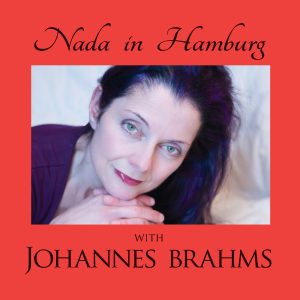 On
On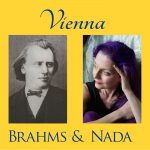 May 7, 2017 award-winning classical pianist Nada will release “Vienna: Brahms & Nada” the second in a series of solo piano works by the prolific Romantic-era composer Johannes Brahms on the MEII Enterprises label.
May 7, 2017 award-winning classical pianist Nada will release “Vienna: Brahms & Nada” the second in a series of solo piano works by the prolific Romantic-era composer Johannes Brahms on the MEII Enterprises label.
May 7 is Brahms’ 184th birthday.
Nada recently talked about her affinity with Brahms and how her relationship to his solo piano works evolved.
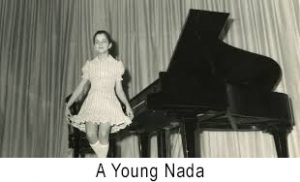 Q: What was your first encounter with Brahms’ music and when did you start playing it?
Q: What was your first encounter with Brahms’ music and when did you start playing it?
Nada: “I was still growing up in Beirut, and probably not even yet taking piano lessons when I first heard his music. The two first pieces I heard were his piano concerto No. 1 and the Double Concerto. About the piano concerto, this memory is linked closely to my godfather—who also introduced me through his collection of records to a great number of classical repertoire—who would talk forever while listening to the piece about the long genesis of this work. The Double Concerto Op. 102 was a recording belonging to my dad’s collection of LPs. There was something very deep about Brahms, I could feel, but it seemed unreachable at the time. This music got stuck in my head. I could tell when I returned to it only a few years ago. It seemed like it had never left me.
“My first attempt to play his music was much later. I had already graduated with a First Prize from the Paris Conservatory, with music by French composer Henri Dutilleux, some Liszt, Bach and Haydn. I had been labeled as a new Clara Haskil and played Mozart, Schubert. Haydn so well it earned me First Prize.
“I formed a piano trio shortly after. The first two works we planned to perform were: the trio by French composer Ernest Chausson and, of course, the first piano trio by Johannes Brahms, an extremely popular piece for this formation. I felt pianistically and emotionally at ease in Brahms’ music 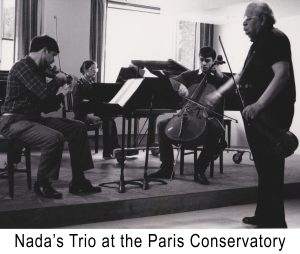 though my understanding was very limited, I know. This happened to be, incidentally, a very grueling experience for me. I performed this program only two weeks after the tragic death of my mom in a bomb explosion in our home in Beirut.
though my understanding was very limited, I know. This happened to be, incidentally, a very grueling experience for me. I performed this program only two weeks after the tragic death of my mom in a bomb explosion in our home in Beirut.
“Again, sporadically and with great intervals in between, I touched up on two solo pieces. I was already living in the U.S. by then and married. My husband himself was a trained musician and pianist. He instigated an old interest I had in Brahms’ second piano concerto. This piece, for which I had already acquired the music, always seemed to be the whole world, despite the fact that I did not know it well at all. But what I gathered was that everything was in those notes, everything you can ever imagine and say in music. This was my impression. So I set to learn it in a few weeks. I still don’t know how I did it, but I was able to play through it for a very small audience with my husband then at the second piano playing the orchestral reduction. Then it disappeared from my repertoire as quickly as I had learned it.
The same fate befell the Fantasies Op. 116 which I learned only for the purpose for a recording as a good complementary piece to the seldom recorded Paul Dukas piano sonata. Absolutely unintentional was the fact that this CD, my first, was to be released on Brahms centennial death anniversary in 1997. This album is now reissued on the MEII Enterprises label.
Q: You seem to point to the fact that you do not know the composer well, yet you released a CD in May 2016 (“Nada in Hamburg with Johannes Brahms”) of his lesser known pieces described by most reviewers as “with a special affinity with the composer’s music.” You’re about to release a second album of Brahms works for solo piano (“Vienna: Brahms and Nada” MEII Enterprises May 7, 2017) and more may be on the way. What has prompted you to go on with this journey now?
Nada: “You see things have radically changed. It seems like I know him intimately and my understanding of his music and his personality goes without question.”
Q: How did this happen? Why this sudden knowledge? It sounds like you walked side-by-side with Brahms for a long time, yet he was not really part of your life. Am I correct?
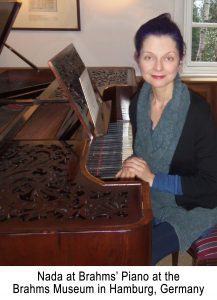 Nada: “Absolutely!!! It is like my entire life I respected a musical figure, unquestionably one of our greatest composers, not daring or even being capable of entering his world. And, on one memorable night, while listening to his ‘Ein Deutsches Requiem,’ this very unique prayer to eternal life and life after death, as no other piece or requiem has ever come close; did I even know it then? But that night, the light came through.
Nada: “Absolutely!!! It is like my entire life I respected a musical figure, unquestionably one of our greatest composers, not daring or even being capable of entering his world. And, on one memorable night, while listening to his ‘Ein Deutsches Requiem,’ this very unique prayer to eternal life and life after death, as no other piece or requiem has ever come close; did I even know it then? But that night, the light came through.
“I lived the experience as magic. The sounds of ‘Ein Deutsches Requiem’ suddenly, and yes, suddenly became the most magnificent music, the most beautiful and moving music I had ever heard until now.
I was riveted to the sounds and tears fell down my cheeks. I felt absolutely blessed and lucky to be able to see him and feel the deep joy and beauty of it all.
“And since then, my world evolved into including Johannes Brahms into my everyday life. I learned and listened to virtually all of his music in the space of two to three years. I devoured everything I could learn, his chamber music, and his lieders. I set to exploring the German language so I could understand and appreciate the beautiful poetry and words of his lieders. And it is an ongoing quest for more. I have the orchestral scores of his symphonies which I can’t wait to study in detail, while I am still short of having learned, but a few pieces left of his solo piano repertoire.”
Q: Do you now feel differently about your understanding of his music/personality?
Nada: “Completely. Now, it is like he is walking next to me in my life, he is sitting by me while learning the music. His music seems limpidly clear in its musical thoughts. The conception, structures, usage of themes, musical ideas, harmonies are all so incredible throughout, it’s like treasure after treasure being discovered, all of this in one of the most beautifully expressive and emotionally direct music ever composed. I could sit down and go through the pieces I know best know, and show you all those little miracles at every corner of each work, all the genius creativity, and of course, the result is this immensely deep and beautiful music, a universe of infinity. Now, my journey will have no end and can go forever!”
About Nada
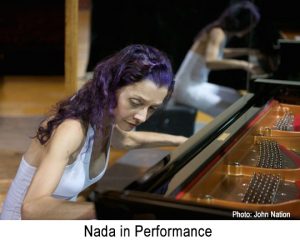 Pianist Nada, a U.S. citizen of Lebanese/Hungarian descent, with an award-winning Paris Conservatory education, enjoys a career as a soloist, radio broadcaster, and educator. She was a first prize winner at the Paris Conservatory who then came to North America for advanced studies at the Banff Center for the Arts in Canada and at Indiana University in the U.S. with the late pianist Gyorgy Sebok.
Pianist Nada, a U.S. citizen of Lebanese/Hungarian descent, with an award-winning Paris Conservatory education, enjoys a career as a soloist, radio broadcaster, and educator. She was a first prize winner at the Paris Conservatory who then came to North America for advanced studies at the Banff Center for the Arts in Canada and at Indiana University in the U.S. with the late pianist Gyorgy Sebok.
Her last recital tour took her to Tokyo and Nagoya, Japan. In Paris and New York City, she has premiered works by great Lebanese composers Bechara El Khoury and Elias Rahbani and recorded pieces by classical/jazz composer Eugene Marlow. Nada has notably performed piano concertos of Bach, Mozart, Beethoven, Brahms, Chopin, Grieg, Rachmaninoff, and Ravel with orchestras in the U.S. and served as Artist-in-Residence in colleges and universities.
Nada organizes, hosts, and performs in her own concert series “The Classical Hour” in Louisville, KY, where she has nurtured a large following of listeners over many years. “The Classical Hour” is a once-a-month live broadcast and a weekly pre-recorded program every Sunday at 4 p.m. local time which can be heard worldwide over the Internet. It is available as a free download at
Nada has recorded four solo piano albums all of which are now on the MEII Enterprises label. They can be found at www.cdbaby.com/artist/nada4.

